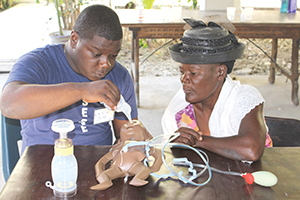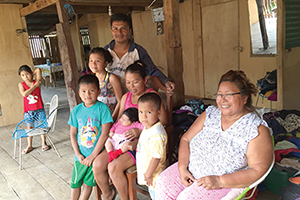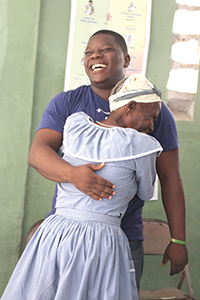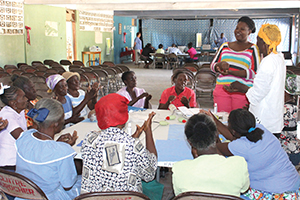By JULIE MINDA
It was about a year ago that nursing technician Jaime Rengifo Amasifuen put his fresh training in infant rescue to life-saving use.

Dr. Jacklin Sime, left, teaches a birth attendant how to suction amniotic fluid from a newborn’s airway to facilitate breathing. He’s a master trainer in the Helping Babies Breathe program in Haiti.
He'd been called in as the birth attendant in a late-night delivery in the Peruvian town of Yana Yacu Bombanaje. Laboring mom Janet Memolada Fatma was experiencing complications that endangered her baby's life.
Rengifo Amasifuen made the call to transport her — along with her husband — by motorized canoe through Amazon River tributaries, so she could get to a larger medical center in Peru's Indiana. Rengifo Amasifuen called ahead to the medical center to ask that personnel meet their canoe at their destination.
Several hours into the journey — which was made more difficult because low river levels hampered passage — Fatma told Rengifo Amasifuen the baby was coming. He stopped the canoe, put on sterile gloves and delivered the newborn, who was clinging to life.
The baby girl was blue and not breathing, and Rengifo Amasifuen thought she was dead, but he used techniques learned during a training session several weeks prior — and a suction and ventilator bag he received during the training — to clear amniotic fluid from the baby's respiratory tract and then to initiate her breathing. The technician then was able to transport mom and baby — later named Janeth Rosario Pisco Memolada — to a nurse waiting in another boat. The nurse cared for the pair enroute to the medical center. Both mom and baby survived.

A birth attendant used skills acquired in Helping Babies Breathe training to save the life of baby Janeth Rosario Pisco Memolada last year. Janeth is shown here on the lap of her mother, Janet Memolada Fatma. The two are surrounded by family members at their home in Peru’s Yana Yacu Bombanaje.
Rengifo Amasifuen is among the more than 360 Peruvian physicians, nurses and birth attendants who have learned how to more safely deliver babies and to improve their chances of survival at birth through Helping Babies Breathe training.
Centura Health's Global Health Initiatives has been offering the course and another healthy birth training called Essential Care for Every Baby since mid-2015 in the Loreto region of Northern Peru.
About a year ago it brought Helping Babies Breathe to the Artibonite region of northwestern Haiti. Global Health Initiatives medical volunteers, and Haitian nurses and physicians whom they have trained, have instructed more than 200 birth attendants in the course.
Karla Prentiss, global program management and development officer for Centura Global Health Initiatives, directs the project. She said infant mortality is particularly high in these regions of Peru and Haiti. The goal of the course is to train a cadre of birth attendants so that at least one skilled birth attendant is at every birth, be it a lay midwife, entry-level practitioner or skilled provider.
She said Centura aims to improve the care babies receive particularly within "the golden minute" after birth, "to save lives and give a much better start" to all newborns. Global Health Initiatives plans to train over 400 birth attendants in Haiti and 600 in Peru by the end of the third year of implementation.
Rough terrain
Centura, which is sponsored in part by Englewood, Colo.-based Catholic Health Initiatives, was active in Peru's Loreto region through Global Health Initiatives when Global Health Initiatives and its collaborators conducted a needs assessment there in 2013. Prentiss said the assessment revealed a need and great opportunity to improve birth outcomes and reduce infant mortality.
Women in Loreto typically deliver their babies at home or at small local clinics that lack the trained personnel or the equipment needed to assist in a difficult birth, according to Dr. Laura Warner, a former Centura medical director who still volunteers with Global Health Initiatives.
Eunice Morán, who oversees Centura's work in Loreto, and Julieta Cachique, a nurse who coordinates and conducts the birth-related and other health care trainings there, said pregnant women in the remote rural region have obstacles that prevent them from traveling to seek care at better equipped facilities.

Haitian birth attendant Amalia Mara, age 70, expresses her thanks to Dr. Jacklin Sime, who was one of her Helping Babies Breathe trainers.
Extreme poverty puts the expense of public transportation out of reach for many. The Amazon and its tributaries are the primary thoroughfares of the region, and pregnant women who can afford to travel must endure long journeys by open boats to reach medical facilities in more populated cities.
Growing experts
Prentiss said Global Health Initiatives decided the best redress was to train and equip birth attendants in outlying areas to recognize and care for mothers and babies in distress. Global Health Initiatives established the train-the-trainer program, which teaches in-country nurses and others to train birth attendants.
CHI's Mission and Ministry Fund has given more than $350,000 to Helping Babies Breathe and Essential Care for Every Baby to date.
The effort uses a set of evidence-based training modules called Helping Babies Survive, developed by the American Academy of Pediatrics, the World Health Organization, the U.S. Agency for International Development and other health and aid organizations. Training kits include an infant mannequin, suction device, stethoscope, workbook and other tools. The course targets the three most common causes of preventable neonatal death: birth asphyxia, preterm birth complications and neonatal infections.
Prentiss said Global Health Initiatives has been working with the Peruvian Ministry of Health to hold the trainings in clinics and other community locations throughout Loreto. The training is free to identified health workers of various skill levels, and Global Health Initiatives pays for food and some transportation for attendees. Global Health Initiatives issues a suction device and basic manual resuscitator as part of the training.
The two-day Helping Babies Breathe workshop teaches techniques for interviewing a pregnant woman to determine her medical and pregnancy history and identify potential concerns.
Participants learn to reduce infection risk by wearing sterile gloves and preparing an area for the delivery. They learn how to resuscitate a neonate who is not breathing, and assist a baby who is struggling for breath. The training is highly interactive — trainees practice techniques on mannequins. Attendees also learn to properly sterilize reusable equipment.
The Essential Care for Every Baby workshop instructs participants on teaching new mothers to nurse and care for their babies.

Nurse Kerby Jules of Haiti’s Hospital Alma Mater, standing, in striped shirt, reviews hand-washing techniques in a follow-up workshop with birth attendants.
Unnecessary deaths
Based on the initial promise of the Peru work, Global Health Initiatives last year brought the Helping Babies Breathe curriculum to Haiti, where it had ongoing health care projects. Graduates can attend quarterly refresher sessions where they can get coached on techniques, share successes and follow up on difficult birthing situations.
Sr. Jacqueline Picard, RJM, is a board member with Hospital Alma Mater in the Artibonite region, a hospital hosting the project. Anne Woudeline Pierre-Jean is a coordinator Global Health Initiatives hired to help rollout Helping Babies Breathe in Artibonite.
Sr. Picard said many women in the rural region choose to deliver at home because of the cost of care and because home birthing is an accepted, traditional practice. Woudeline Pierre-Jean said even those who choose to deliver in a clinic have no guarantee of a safe delivery. Apart from those now trained by the Global Health Initiatives project, few rural clinics have personnel adequately trained to manage a crisis delivery.
Nancy Vidal is a pediatrics and emergency room nurse at Hospital Alma Mater who completed the training. "Before, I didn't know what I should do" in crisis births, Vidal said. Prepped with skills acquired in the Helping Babies Breathe training, she has confidence to "go right into action."
Vidal said the training will save lives. "Before, children died unnecessarily. They could have been (resuscitated). I want to see more people trained so that more lives are saved."
Copyright © 2017 by the Catholic Health Association
of the United States
For reprint permission, contact Betty Crosby or call (314) 253-3490.